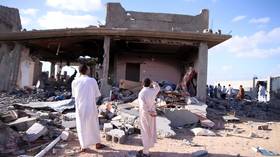Libyan factions end talks as central bank crisis persists
The UN mission in the African nation says no deal was reached despite parties previously agreeing to appoint a new bank governor
The legislative bodies representing Libya’s two competing governments have failed to reach a final agreement on resolving an ongoing central bank crisis, the UN Support Mission in the North African nation (UNSMIL) has reported.
UNSMIL had hosted a two-day consultation between delegates from the Benghazi-based House of Representatives (HoR) and the Tripoli-based High Council of State (HCS) to get them to finalize an agreement on the appointment of a new Central Bank of Libya (CBL) governor.
Following the conclusion of talks on Thursday, the mission said it “welcomes the progress achieved on the principles, criteria, and timeline that should govern the interim period leading to the appointment” of new CBL leadership.
“However, it regrets that the two parties have yet to reach a final agreement,” UNSMIL said in a statement.
The North African country, which has had little peace since a NATO-backed uprising ousted longtime ruler Muammar Gaddafi over a decade ago, descended into fresh turmoil last month when the Presidential Council (PC) in Tripoli issued a decree removing the CBL Governor Sadiq al-Kabir. The veteran had led the central bank – Libya’s only internationally recognized repository for oil revenues and foreign reserves, since 2011.
The PC is affiliated with the interim Government of National Unity or western administration, installed as part of a UN-backed process to prepare for elections.
The eastern administration in Benghazi, home to the national parliament (HoR), deemed the “unilateral” removal of Governor Kabir “unacceptable” and shut down all oil production and exports in protest.
The National Oil Corporation canceled cargoes amid the struggle for control of the CBL and oil revenue, resulting in an 81% drop in the country’s oil exports last week, Reuters reported, citing data from analytics firm Kpler.
Last week, two legislative chambers (HoR and HCS) agreed to jointly appoint a central bank governor and defuse tensions after initial UN-led negotiations.
UNSMIL, which was established in the aftermath of the civil war to coordinate Libya’s political process, has been engaging the parties since the onset of the latest crisis. It says the situation “poses serious risks to the well-being of Libyans and to Libya’s relationships with international partners.”
“Unilateral decisions made by all parties across the country undermine trust among political and security actors and entrench institutional divisions,” UNSMIL said on Thursday, insisting that “comprehensive dialogue remains the only path” to achieving sustainable peace in the once-prosperous African nation.






Comments are closed.